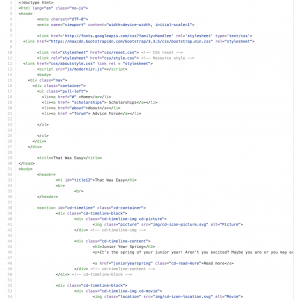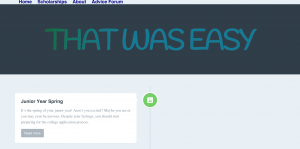Should humanities students learn how to code? YES! Is it necessary they become experts? NO!
Coding is great skill to have, regardless of what you major in. I think humanities students should learn how to code because it gives them the possibilities to study the world in a whole new different way. Just like Matthew Kirschenbaum mentions in his article “Computers should not be black boxes but rather understood as engines for creating powerful and persuasive models of the world around us.” I think that the humanity student should have at least some basic knowledge of coding. Inter-connections between fields is what allows for a deeper understanding between them to occur; exploring coding can offer “endless vistas in which to see our own world reflected.”
I recognize that because I have a huge interest in coding, my opinion may be somewhat skewed.
I participated in Google’s Computer Science Summer Institute (CSSI) this past summer, and one of the most important aspects they emphasize about the coding is that it is not just about coding. Coding ties different fields together, and gives you the power to create, and make information accessible. Many of the Google Engineers I met had not majored in Computer Science, or related fields, some were History majors, others Linguistics majors, and some of them even partook in Google projects that allowed them to put those majors into practice.
As part of CSSI, I had to create a web application with two other teammates. While of course, the web application involved coding, incorporating different languages, databases, API’s, among other things, that was just 50% of the work. In our cases, our web application –That Was Easy!– was a timeline hoping to guide high school juniors and seniors through the college application process. It offered other mediums as well, including a database of scholarships and a place for students to create blogs about their experience with the application process, and also to ask questions. So while our web application was not particularly a humanities project, it still involved different components apart from the coding itself.
I view coding as compliment to creating projects in different fields, just like how my team brought together a project that essentially was under the education tab, but that was made interactive thanks to coding. Online tutorials such as Codecademy make learning basic coding accessible to everyone. Although I had created an account over a year ago, it wasn’t until a few months ago that I really began making use of it. While I already have some knowledge in coding, albeit minimum, I like the lessons because they remind me of concepts I may have forgotten. For someone who is just starting out, or wants to continue learning different languages, I highly recommend Codecademy. For humanities students, I think Codecademy is a great resource to develop the knowledge needed in order to begin applying it to projects, and see the interconnections between them.


Ana, your experience at the Google CSSI sounds fantastic. It is nice to know that many Google employees came from humanities backgrounds, and I’m heartened to hear that your experience taught you that coding is a complement to all the other decisions and realms of knoweldge that must be brought to bear on a successful project. This is just as true, if not more so, in the Digital Humanities as it is in designing a web app.
Your background in coding sounds really exciting! I like your emphasis in this post about programming being especially powerful in conjunction with other disciplines. It made me think of a reading that was assigned recently for another class, wherein Wendell Berry lamented the rise of specialization.
To be a student of humanities and a skilled programmer may prove more valuable than simply to specialize in one field.
I found your personal ties to your stance on the issue amazing! I would never have guessed that so many of the Google Engineers you met had not majored in Computer Science or other related fields. However, in a way I think it’s better to get such a wide range of contributions to the company and its projects. Your multiple images were also great touches! Lastly, your stance on Codecademy was spot on. I couldn’t have said it better myself. It is a fantastic tool for anyone learning to understand and begin to practice code.